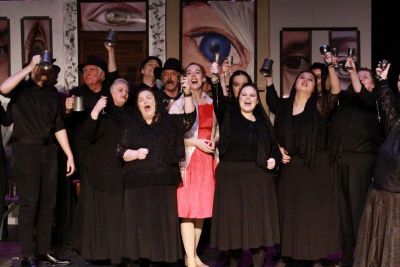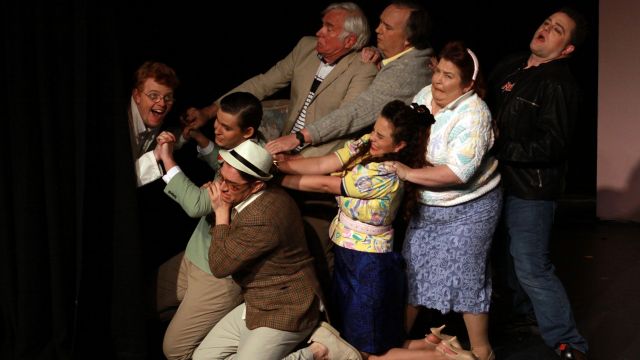Cavalleria Rusticana and Gianni Schicchi
For this year’s performance, Canberra Opera presents an interesting pairing of two one-act operas, Puccini’s comedy Gianni Schicchi and the beautiful tragedy, Cavalleria Rusticana. Both have been made accessible by using an English translation.
The night opens with Gianni Schicchi, a classic tale of a greedy family plotting to reclaim a dead relative’s inheritance which has been reset to the 1970s. Colin Milner is hilarious in the lead role as the conman Schicchi, complete with mauve satin shirt open to his navel and a profusion of gaudy medallions. Milner’s allusion to the consequences of the family being caught, while in the middle of his con act, was very nicely handled.
This opera is just on the cusp of modernism, and there’s a degree of rhythmic complexity and some discordance which makes it challenging. This affected the opening piece “Povero Buoso” particularly, where there was a sense that although everyone was hitting the right notes generally in the right place, the musicality was not quite there, possibly because everyone was a bit on edge. This is relieved immediately “Avete Torto” starts, sung beautifully by Rinuccio (Alastair Cosgrave). Also excellent was “Era Eguale La Voce”, the trio by Zita (Janene Broere), la Ciesca (Katrina Wiseman) and Nella (Stephanie McAlister) whose two mezzo soprano and soprano voices meld beautifully. Hannah Carter’s version of Lauretta’s famous aria “Oh Mio Babbino Caro” was soaringly beautiful and slightly mischievous.
 The second piece, Cavalleria Rusticana, was musically the more coherent and consistent. In the lead role as Santuzza, Anna Greenwood’s lilting soprano was a joy to listen to throughout, imbued with poignancy and emotion. James Penn rendition of Turridu’s opening song from offstage is lovely. Veronica Thwaites-Brown and Andrew Barrow were also standouts as Lola and Alfio. When the entire cast comes together to sing about the marigolds in spring, the Easter Hymn and all the other group pieces, it’s positively joyous.
The second piece, Cavalleria Rusticana, was musically the more coherent and consistent. In the lead role as Santuzza, Anna Greenwood’s lilting soprano was a joy to listen to throughout, imbued with poignancy and emotion. James Penn rendition of Turridu’s opening song from offstage is lovely. Veronica Thwaites-Brown and Andrew Barrow were also standouts as Lola and Alfio. When the entire cast comes together to sing about the marigolds in spring, the Easter Hymn and all the other group pieces, it’s positively joyous.
The emphasis tended to be on the music over the other aspects of production and the casts in general were stronger singing than acting. Both pieces were perhaps a little undermined by the quality of the sets, which while creative and symbolic were not realised as well as they could be. If I had a suggestion it would be that when there isn’t time and money to make something elaborate, perhaps aim for simple, striking and minimalist.
That niggle aside, it was a joy to hear these sparkling voices meld so beautifully.
Cathy Bannister
Subscribe to our E-Newsletter, buy our latest print edition or find a Performing Arts book at Book Nook.

